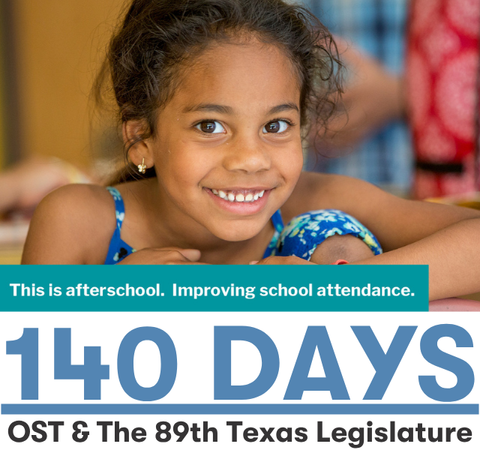Advocating for Afterschool & Session Deadlines
May 1, 2025

Advocates across the country are preparing for a key moment outside the dome. On Tuesday, May 6, the Afterschool for All Challenge offers a national opportunity to remind Congress why afterschool and summer programs matter. Organized by the Afterschool Alliance, the Challenge includes several ways to participate: contact your elected officials using the Challenge action center, join the Policy Pulse briefing on May 2 at 11 a.m. CT, and help spread the word using the Digital Action Toolkit. In a session where timing is everything, this is another moment to raise our voices for the youth and communities OST programs serve.
A bit closer to home, the Texas Legislature is in full swing with just one month to go. Longer days and lengthy calendars have legislators working late into the night to get their work done before June 2, 2025, when they will adjourn Sine Die. As we near the deadlines of this last month, tensions rise and political maneuvers get more personal. This session is no exception.
In response to a heated debate on school vouchers, Democrats have been voting down other initiatives the House is proposing to bring to the public for approval on the ballot in November. Local calendars have been dismantled not for content but to make a point about the process and priorities of the chamber. And yet, a version of this occurs in late April to mid-May of every session. It is a part of the fabric of the process.
Speaking of the process, paperwork takes a center stage in this last month as well. HB 3672—a bill to create a competitive grant program to fund community-based OST—was voted out of committee last Tuesday by a vote of 14-0, moving it forward in the process to the next step. After being ‘reported favorably by the committee’ the bill disappears into an administrative process related to filing and distributing a committee report version of the legislation before sending it to the Calendars Committee. While this process typically takes approximately one week to complete, as more bills stack up near the end of session and as last minute changes are made requiring reprinting from bill drafters, this is a key place for legislation to stall out.
For HB 3672, we’ve made it through the process and are in front of Calendars! In the Calendars Committee, members review all legislation on their docket to determine which bills will be brought up for consideration before the House and when. They set the speed and order of debate for the chamber. This is another key step in which bills can get stuck until the clock runs out.
We’re closely monitoring Calendars meetings and indicating support for this legislation to every member of the committee. Bills without stringent opposition can remain in committee for a week without raising alarm bells, which would still give legislators plenty of time to debate and vote on the bill before a slew of deadlines kick in in the next two weeks.
Elsewhere in the Capitol proposals are moving forward on a number of key priorities for leadership, including the regulation of THC, investing in water infrastructure, examining public school accountability, and much more.
The first bill to pass this session was Texas’ own version of DOGE, establishing the Texas Regulatory Office (Office) as an office within the Office of the Governor (OOG). The bill would allow for the Office to establish the Texas Regulatory Efficiency Advisory Panel (Panel) to serve as an advisory panel to the OOG, as needed. A handful of additional bills await the Governor’s signature or veto, and this list will begin to grow rapidly over the next few weeks.

